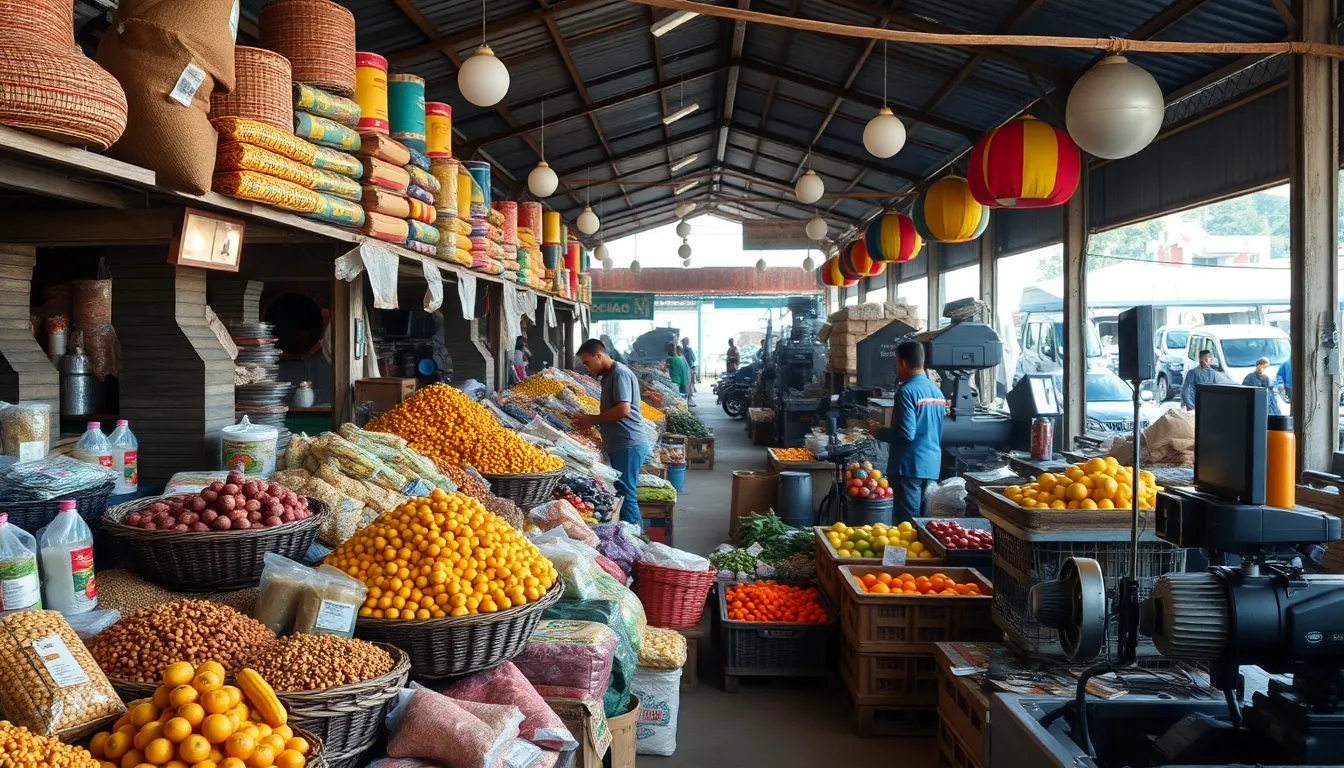Colombia isn’t just famous for its coffee and beautiful landscapes; it’s also a treasure trove of imports that keep the world buzzing. From the rich aroma of Colombian coffee to the vibrant colors of its flowers, this South American gem offers products that are hard to resist. Who wouldn’t want to sip a cup of the world’s finest brew while daydreaming about tropical paradises?
Table of Contents
ToggleOverview of Colombian Imports
Colombia imports a wide variety of goods that support its economy and enhance trade relationships. Machinery and electronics represent significant import categories. In 2022, Colombia imported around $12 billion worth of machinery, facilitating technological advancements and industrial growth.
Chemical products also play a vital role in Colombian imports. Imports of chemicals amounted to approximately $8 billion in the same year, ensuring access to essential components for various industries including agriculture and manufacturing. Food products meet local demands, with Colombia importing about $6 billion worth of staple items like grains and dairy.
The clothing and textile sector showcases notable imports as well. This segment contributed around $3 billion to Colombia’s import totals, reflecting a need for diverse apparel and materials to satisfy consumer preferences. Automotive products also hold substantial import value. Approximately $4 billion in vehicles and automotive parts entered the country, supporting the transportation and logistics sectors.
Colombian imports extend to furniture and home goods too. Around $2 billion worth of these products enhanced domestic market offerings, providing consumers with varied choices for their homes. Pharmaceuticals demonstrate a crucial area of imports, constituting nearly $5 billion due to the demand for medical supplies and health-related products.
Trade continues to evolve, and Colombia’s import landscape reflects its diverse consumer needs and industrial requirements. By engaging in global trade, Colombia positions itself strategically within international markets and strengthens economic ties with various countries.
Key Categories of Imports

Colombia actively engages in various import categories that reflect its diverse economic needs. Understanding these imports highlights the country’s trade dynamics.
Agricultural Products
Colombia imports significant volumes of agricultural products. The import of grains, especially wheat and corn, amounts to about $2 billion annually. Additionally, dairy products are essential for meeting domestic consumption demands. Fruits and vegetable seeds also find their way into Colombian markets, fulfilling agricultural gaps and supporting local food production.
Industrial Goods
Industrial goods represent a crucial aspect of Colombian imports. Machinery and electronics lead this category, with imports reaching around $12 billion in 2022. Heavy machinery aids in infrastructure development while electronics enhance consumer access to technology. Imports in this sector not only support industrial growth but also advance technological innovation across various fields.
Raw Materials
Raw materials play a vital role in Colombia’s import landscape. Chemicals, essential for manufacturing and processing, account for approximately $8 billion in imports. Additionally, the country imports metals and minerals, contributing to various industries like construction and manufacturing. These raw materials ensure a steady supply chain, fueling domestic production and enabling economic stability.
Major Import Partners
Colombia’s trade relationships significantly shape its import landscape, with key partners contributing to various sectors.
The United States
The United States stands as Colombia’s largest import partner. In 2022, imports from the U.S. totaled approximately $12 billion. Key imports include machinery and electronics, essential for technological development. Chemical products also feature prominently, accounting for nearly $8 billion of the total. Additionally, vehicles and automotive parts consistently rank high on the list, reflecting a need for transportation and industrial support. The diverse range of U.S. products helps meet Colombian consumer demand and supports economic growth.
European Union
The European Union constitutes another vital import partner for Colombia. Approximately $7 billion in products arrived from EU member countries in 2022. Machinery remains a top import category, followed by pharmaceuticals, which totaled around $5 billion. Chemical products also play a significant role, supporting various industries. Fashion and textiles from Europe appeal to Colombian consumers, reflecting trends in clothing and accessories. This partnership enhances Colombia’s economic framework by diversifying its import sources and strengthening trade ties.
Impact of Imports on the Economy
Imports play a significant role in Colombia’s economic landscape and contribute to various sectors. They enhance development, create jobs, and influence trade balance positively.
Job Creation
Job creation stems from import activities in diverse sectors of the economy. Sourcing machinery and electronics generates employment opportunities in technological fields. The clothing and textile industry, with around $3 billion in imports, facilitates jobs in manufacturing and retail. Agricultural imports, particularly grains and dairy products, also support farming and distribution roles. Moreover, the automotive sector employs thousands as imports of vehicles and parts reach approximately $4 billion. Investments in furniture and home goods, valued at about $2 billion, stimulate local job markets as businesses grow to meet consumer demand.
Trade Balance
Maintaining a favorable trade balance proves essential for economic stability. Imports, though substantial, enable Colombia to enhance its export potential. In 2022, the country imported $12 billion from the United States, bolstering technological infrastructure while encouraging local production. The European Union’s $7 billion in imports, primarily machinery and pharmaceuticals, allows for diversification of goods and services. Despite the high import figures, Colombia’s exports strengthen, supporting industries and creating value in international markets. A balanced approach to imports and exports ultimately fosters economic resilience and global competitiveness.
Colombia’s import landscape is a testament to its dynamic economy and global connections. The diverse range of products imported not only supports local industries but also enhances the quality of life for its citizens. From advanced machinery to essential food items, these imports are vital for maintaining economic stability and fostering growth.
As Colombia continues to strengthen its trade relationships, the impact of these imports will be felt across various sectors. By embracing international partnerships, Colombia positions itself as a key player in the global market, ensuring a robust supply chain that meets both consumer demands and industrial needs. This strategic focus on imports will undoubtedly contribute to the nation’s ongoing economic development and resilience.





